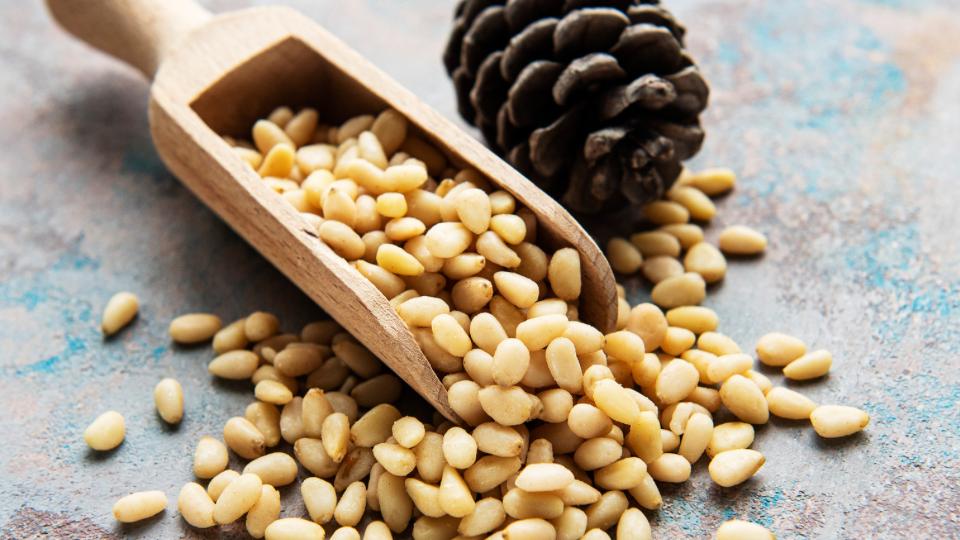Hidden within pine cones, pine nuts offer promising benefits for health and flavor. Despite their small size, these tiny yet powerful snacks are packed with healthy fats, protein, fiber, and various vitamins and minerals. They support heart health, provide a feeling of fullness, are rich in antioxidants, and add flavor to various dishes. Consider adding pine nuts to your diet for their significant health benefits, despite their diminutive stature.
Pine nuts are edible seeds derived from the cones of pine trees, specifically those belonging to the genus Pinus. They are often harvested from species like the Pinus pinea, also known as the Italian stone pine, which is common in the Mediterranean region.
Pine nuts are small, ivory-colored seeds with a slightly sweet and nutty flavor. They are commonly used in various cuisines, notably in making pesto sauce, as well as in salads, desserts, and various dishes to enhance flavor and nutritional value.
These nuts are rich in protein, fiber, vitamins, and minerals. They are particularly high in vitamin E, magnesium, zinc, and iron. Additionally, they contain healthy fats, making them a nutritious and energy-boosting snack.
Due to the labor-intensive and time-consuming process of harvesting and processing pine nuts, they are often more expensive compared to other nuts. Despite this, their unique flavor and nutritional benefits make them a valued ingredient in many culinary traditions.
Nutrient-Rich: Pine nuts are a good source of vitamins (such as vitamin E and K) and minerals (including magnesium, iron, and zinc).
Heart Health: They contain monounsaturated fats, which can help reduce bad cholesterol levels and promote heart health.
Antioxidants: Pine nuts are rich in antioxidants, which help protect cells from damage and reduce inflammation.
Energy Boost: They provide a good amount of protein and healthy fats, offering sustained energy.
Weight Management: The pinolenic acid in pine nuts may help suppress appetite by stimulating the release of appetite-suppressing hormones.
Bone Health: Pine nuts contain vitamin K and magnesium, which are important for maintaining healthy bones.
Eye Health: They provide lutein, an antioxidant that supports eye health and may reduce the risk of cataracts and age-related macular degeneration.
Skin Health: The vitamin E in pine nuts helps maintain healthy skin by protecting it from oxidative damage.
Immune Support: Zinc in pine nuts supports a healthy immune system.
Pesto: Pine nuts are a key ingredient in traditional basil pesto. Blend together fresh basil, pine nuts, garlic, Parmesan cheese, and olive oil for a flavorful sauce that can be tossed with pasta, spread on sandwiches, or used as a dip.
Pasta: Pine nuts add crunch and flavor to pasta dishes. Try adding toasted pine nuts to pasta salads, creamy pesto pasta, or tossing them with sautéed vegetables and olive oil.
Salads: Pine nuts make a great addition to salads, providing texture and nutty flavor. Sprinkle toasted pine nuts over green salads, grain salads, or roasted vegetable salads for extra crunch.
Grain Dishes: Pine nuts can be mixed into grain dishes like quinoa, couscous, or rice pilaf to add a nutty flavor and enhance the texture.
Stuffed Vegetables: Use pine nuts as part of a stuffing mixture for vegetables like bell peppers, mushrooms, or tomatoes. Combine pine nuts with breadcrumbs, herbs, cheese, and other fillings for a delicious and satisfying dish.
Roasted Vegetables: Roast vegetables such as Brussels sprouts, cauliflower, or carrots with olive oil and sprinkle toasted pine nuts on top before serving for added flavor and crunch.
Baked Goods: Pine nuts can be used in sweet or savory baked goods. Add them to biscotti, cookies, cakes, or muffins for a unique flavor and texture.
Hummus: Pine nuts can be incorporated into homemade hummus for extra richness and flavor. Blend chickpeas, tahini, lemon juice, garlic, olive oil, and toasted pine nuts until smooth for a tasty dip or spread.
Stir-Fries: Pine nuts can be included in stir-fry dishes along with vegetables, tofu, or meat. Add them towards the end of cooking for a crunchy texture and nutty flavor.
Trail Mix: Combine toasted pine nuts with dried fruit, nuts, and seeds to create a homemade trail mix for a nutritious and satisfying snack.